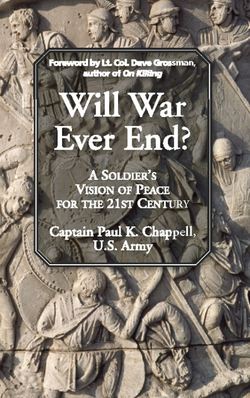Читать книгу Will War Ever End? - Paul K. Chappell - Страница 6
На сайте Литреса книга снята с продажи.
ОглавлениеFOREWORD
Lt. Col. Dave Grossman, U.S. Army (ret.)
author of
On Killing: The Psychological Cost of Learning to Kill in War and Society
The book you hold in your hand makes a powerful new contribution to our understanding of war and peace, and provides us with vital insights into fundamental aspects of human nature. I sincerely believe that the fields of philosophy, anthropology, history, military science, peace studies, and many others, will be able to build upon the concepts set forth in this book in order to help guide our civilization toward a world without war.
A bold statement? Perhaps. Read this book and see what you think.
As for me, I was consumed with an admiration verging on awe when I first read this book. Paul K. Chappell’s concepts of fury, rage, and “the pain of hatred” struck me with an almost physical impact. He has transformed my way of thinking about war and peace. And I believe (and hope, and pray) that his powerful logic and lucid insights will continue to contribute to our civilization for generations to come.
My book, On Killing: The Psychological Cost of Learning to Kill in War and Society, is currently being used as “required reading” in peace studies programs at Berkeley, and in Mennonite and Quaker colleges. On Killing is also on the U.S. Marine Corps Commandant’s “Required Reading List” and is required reading at the FBI Academy and in courses at West Point. How do you make institutions as diverse as Berkeley, the FBI, the Quakers, the U.S. Army and the Marine Corps happy with the same book? The answer is: you just tell the truth. New truths. Powerful truths. Useful truths.
I freely and willingly take whatever credibility On Killing gives me, and “put it on the line” to commend this book to your attention. For it has provided me with new, powerful, and useful truths. This book has drawn from my work (and that of many others, for mine is but a small contribution) and brought them to a deeper, more useful, and more important level.
And there is cause to hope, and believe, that there can be an end to war.
The West has won the Cold War without resorting to mega-death, genocide, or nuclear holocaust. For the first time in history the majority of the world’s population elects their national leaders, and democratically elected governments generally do not go to war with other democracies.
Writing in his syndicated newspaper column, political science professor Bradley R. Gitz flatly states “there is no agreed-upon historical case of a democratically elected government going to war against another democratically elected government.” He believes that one of the “axioms” of political science is that “democratic states don’t fight democratic states or provide support for terrorist groups.” He quotes political scientist John Mueller, who “has gone so far as to assert that war between such states has become ‘subrationally unthinkable,’ not even on the radar screen of options to be considered as a means of resolving disputes.”
With the Soviet Union and the Warsaw pact gone, the goal of democracies around the world is to foster democracy. Once a nation has become a democracy, it has effectively been “inoculated” against going to war with other democracies.
Thus, there is, in our time, cause to hope for an end to war. And we didn’t just get here overnight. If we look for it, we can observe a persistent trend toward “limiting” war. We can see it with the classical Greeks, who for four centuries refused to implement use of the bow and arrow even after being introduced to it in a most unpleasant way by Persian archers.
In Giving Up the Gun, Noel Perrin tells how the Japanese banned firearms after their introduction by the Portuguese in the 1500s. The Japanese quickly recognized that the military use of gunpowder threatened their society and culture. Thus they moved aggressively to defend their way of life. The feuding Japanese warlords destroyed all existing firearms and made the production or import of any new guns punishable by death. Three centuries later, when Commodore Perry forced the Japanese to open their ports, they did not even have the technology to make firearms. Similarly, the Chinese invented gunpowder but elected not to use it in warfare.
The most encouraging examples of restraining killing technology have all occurred in the twentieth century. After the tragic experience of using poisonous gases in World War I the world has generally rejected their use ever since. The atmospheric nuclear test ban treaty and the ban on the deployment of antisatellite weapons are both still going strong across many turbulent decades, and the United States and the former USSR have been steadily reducing their stockpiles of nuclear weapons since the end of the Cold War.
Heckler points out that there has been “an almost unnoticed series of precedents for reducing military technology on moral grounds,” precedents that show the way for understanding that we do have a choice about how we think about war, about killing, and about the value of human life in our society.
In recent years we have exercised the choice to step back from the brink of nuclear destruction. We have moved the world toward democratically elected states that are “inoculated” against going to war with each other. There is, indeed, good cause to hope for an end to war. And I believe, with all my heart, that in this book Paul K. Chappell has made a major contribution toward that most worthy and noble endeavor.
Lt. Col. Dave Grossman, U.S. Army (ret.) has served as an Airborne Ranger infantry officer and West Point psychology professor, and is the Director of the Warrior Science Group. He is the author or co-author of several books, including On Killing, which was nominated for the Pulitzer Prize.
